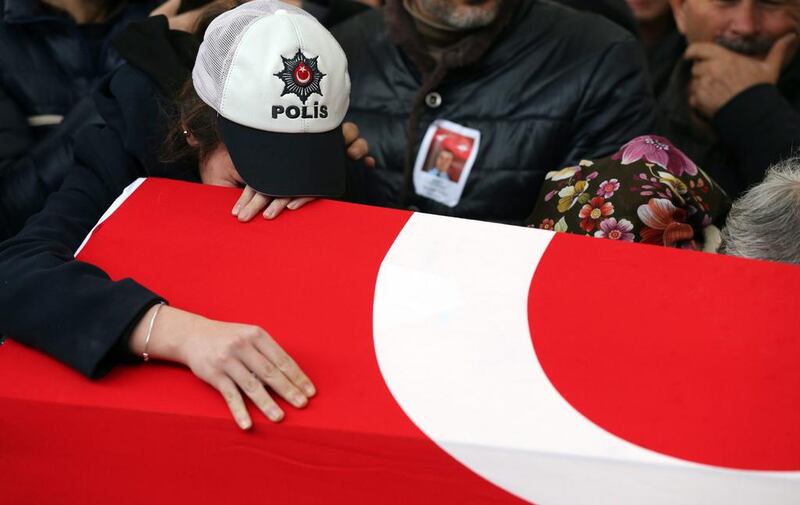The rhetoric of Turkish leaders after last Saturday’s double bombing on the Besiktas football stadium that claimed the lives of at least 44 people, many of whom were police officers, reveals many things about the country’s state of mind and its lack of a wide-ranging counterterror strategy.
As would be expected, the reaction of president Recep Tayyip Erdogan and members of the ruling Justice and Development Party (AKP) to the outrage claimed by the Kurdistan Freedom falcons (TAK), an offshoot of the Kurdistan Workers Party, was one of condemnation in the strongest of terms.
Mr Erdogan spoke of “martyrs”, stating that, “with God’s help we will overcome it [terrorism], and if we die we are martyrs”. Binali Yilderim, the country’s prime minister, shared similar sentiments.
Close to the Besiktas stadium is a popular hill where those unable to purchase tickets may sneak a peek at a match. Known to many Turks by its unofficial name that roughly translates as “freebie hill”, it has already been renamed by the local municipality to “martyrs hill”.
Turkey is in a very sombre mood. Not only did last summer’s coup attempt claim 265 lives, Turkey is also facing a terrorist threat from both the PKK and ISIL. Since June 2015, at least 330 people have been killed, excluding Saturday night’s atrocity.
As the sociologist and journalist Enver Aysever recently commented: “It’s like the whole country resembles a graveyard walking around in coffins”. But not everyone is happy with this language of martyrdom. The father of one of Saturday’s victims commented frankly that he didn’t want his son to be considered a martyr. He would rather he was seen as someone who had been murdered.
It appears that Turkey’s politicians are trying to prepare the country for further fatalities. Turkey lacks an efficient counter-terrorism strategy. Instead, Ankara takes knee-jerk and ineffective reactions. In response to Saturday’s attack, Turkish jets pounded PKK targets, and the following day it arrested hundreds of members of the Kurdish orientated and liberal Peoples’ Democratic Party (HDP).
Such measures are unlikely to bear fruit. Just hours before Saturday’s bombing, it was reported that Turkish forces had killed 19 members of the PKK in northern Iraq. And last month, Turkey arrested HDP parliamentary deputies on spurious terrorism-related charges, including its co-leaders Selahattin Demirtas and Figen Yuksekdag. Not only did these measures fail to prevent the actions of the PKK, but the arrest of HDP parliamentarians drew widespread condemnation from the international community, and, no doubt, angered many Kurds.
The best way for Turkey to tackle its terrorism problem is to deal with one threat at a time. Instead of targeting the HDP, Ankara should engage the pro-Kurdish party in dialogue, while targeting the PKK with surgical strikes and gather information on its terrorist cells. This way, moderate Kurds will have a non-violent outlet to air their grievances. In the longer term, the HDP can be once again used as a go-between the Turkish state and elements of the PKK who may, in time, be convinced to lay down their arms. Sure, it’s been tried before, but it is certainly worth another attempt. Because by doing so, Turkish forces will also have the additional operational capacity to fight ISIL.
However, this policy is unlikely to be adopted by Mr Erdogan and his AKP government. It’s a tough sell to the general Turkish public. It would also put in jeopardy Mr Erdogan’s plans to transform Turkey’s parliamentary system into a presidential one to give him greater powers. These constitutional changes have already been drafted despite Turkey being in a state of emergency. But its success rests on the support of the ultra-right Nationalist Movement Party (MHP), which is loath to make any concessions or countenance a reconciliation with the Kurds.
Instead Mr Erdogan will continue with his plans for greater executive powers while the country is overstretched in its fight against ISIL, the PKK, and, of course, the Gulen movement. No wonder he and his government talk of martyrs. Sadly, it seems very likely that there will be many more.
Simon A Waldman is a visiting research fellow at King’s College London and co-author of the recently published The New Turkey and Its Discontents.
On Twitter @simonwaldman1





